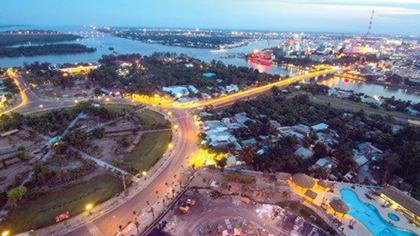Mekong to battle climate change
The infrastructure needs of the Mekong Delta to battle the impact of climate change will be a key factor before setting up six agro-ecological zones in the region, Deputy Minister of Construction Phan Thi My Linh said in Hanoi early this week.
 |
| A corner of Ninh Kieu ward of Can Tho City in the Mekong Delta. Infrastructure needs of the Mekong Delta to battle the impact of climate change will be a key factor before setting up six agro-ecological zones in the region (Source: VNA) |
An adjustment to the region's long-term plan, which was designed to fix shortcomings in the delta's infrastructure plan issued in 2009, is believed to be imperative because the 2009 plan failed to integrate the infrastructure plan into the socio-economic development plan and did not foresee the impact of climate change.
Linh said the adjustment was arduous not only because the delta was the hub of biodiversity, the centre of rice growing and a strategic location for national security and defence, but also because the area is suffering the most from climate change.
She said the most notable thing of the adjustment's report was its highlight on climate change's impact in the delta.
Following the adjustment, the delta's Plain of Reeds [mostly the wetlands within Long An and Dong Thap provinces] are expected to become the rich area thanks to aqua-farming and planting cajuput forest; in the meantime, rice, vegetables and fruit will be grown in the southern area to Hau River as well as a part of the Long Xuyen Quadrangle. And mangrove forests and protective forests are scheduled to be developed across the delta.
One of the aims of the adjustment is to direct the delta's 2030 construction plan toward focusing on ecosystem conservation.
In June 2014, Deputy Prime Minister Hoang Trung Hai gave the green light to the ministry to compile the adjustment.
Hai said the adjustment should be made to raise the status of the delta's economic development and ecosystem conservation in the country and the region.
It targeted to turn the delta into the key of agriculture production and aquaculture in the country, as well as developing marine economy and ecology tourism in the region, he said.
The adjustment had to fit with national strategies on green growth, sustainable development and climate change, he said.
The Mekong Delta, covering about 40,600 square kilometres, stretching over Can Tho City and 12 provinces, is now home of 17.3 million people. The delta's population is predicted to reach about 20 million with the rate of urbanisation of 40 to 45 percent by 2030.
(Source: VNA)
 về đầu trang
về đầu trang






